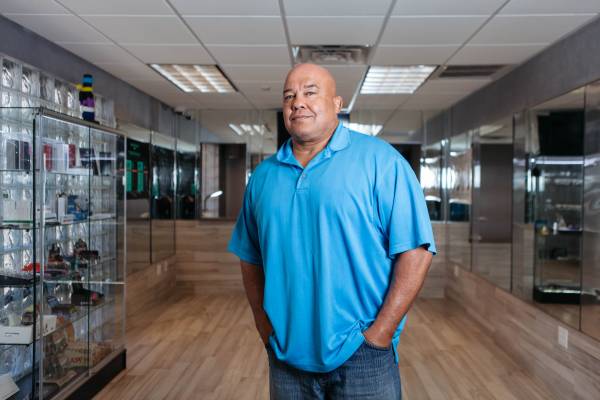On one hand, you can count the number of black-owned or -operated marijuana businesses in Southern Nevada:
Zion Gardens, Nevada Wellness Center, G5 Cultivation, NLV Organics and Nature’s Kindest. Sixty medical marijuana facilities and 88 dispensaries have been licensed in Nevada since 2015, when the first establishment opened. Nearly 50 businesses can now sell for recreational purposes, as July 1 was the first day of legal sales without a medical marijuana card. Nevada’s weed industry has risen, and minorities are working to carve out their piece of the profit.
“There is no reason why black people shouldn’t be in this business,” said A’Esha Goins, a lobbyist and creator of the Blackabis blog. “We are incarcerated because of this business.”
Considering some estimates have the industry generating hundreds of billions of dollars over the next two years, Goins, who also is an assistant manager at Nevada Wellness Center, said those left out are missing out.
“If you’re in the game right now, you’re winning,” she said.
But it’s more than that.
Goins, Larry Smith (who owns G5 Cultivation) and Delbert Cannon (operations manager at Nature’s Kindest) see value in how this business helps people.
“This isn’t a bunch of hippies doing this,” Smith said. “When you do the research, and you meet people with HIV, or cancer, or lupus who benefit from (the medicinal effects), you see value in the industry.”
Despite African-Americans’ interest and passion, there are many issues they face when trying to enter this industry, according to those in it.
Smith said one of the first struggles for the black community was lack of capital.
“I think the $250,000 scared people off,” he said, referring to the requirement that people need access to that amount to secure a license.
For those who do find the money, it usually isn’t large donors financing the business.
“We are mom-and-pop shops battling big bucks,” Goins said.
Some places, such as Nevada Wellness, pull resources from multiple owners (the business is owned by Andre Rhodes, Luther Mack and former pro football player Frank Hawkins). But Smith said in general, financing was the primary obstacle aspiring entrepreneurs can’t overcome.
Going into the business also means passing a background check, which means not having a criminal record. But blacks have been criminalized for marijuana possession at a disproportionate rate to whites — a 2013 National Survey on Drug Use and Health report found that drug use was 9.5 percent among whites and 10.5 percent among blacks, while a 2013 study by the American Civil Liberties Union found that on average blacks were 3.73 times as likely as whites to be arrested for marijuana (in some counties, they were 10 times as likely to be arrested).
Goins said the background check wasn’t necessarily done with racist intent, just lack of forethought to the unique issue minorities face.
“The states are taking a huge risk in allowing medical (or recreational),” she said. “I understand what they’re doing from a business perspective.”
Amid refinement of state regulations to ensure compliant, trustworthy business owners, there needs to be give-and-take, she said.
“If you’ve been clear or free for a certain amount of years, you should be able to get a license,” Goins said of those with prior convictions. “There should be a conversation in each state that if you qualify but (a past marijuana possession charge) is the only thing that makes you unqualified, let’s have a conversation. There aren’t any models like that, though.”

Assemblyman William McCurdy II
Assemblyman William McCurdy, D-Las Vegas, proposed Assembly Bill 259 in the 2017 legislative session, which would have allowed people with marijuana-related crimes on their records (assuming their possession was under the current legal limit) to be cleared. The Legislature approved the bill, but it was vetoed by Gov. Brian Sandoval.
Goins said some of the stigmatization that owners (or even potential owners and legal users) face comes from within their own community.
Because of that, those in the black community who support or use marijuana might not be open to talking about it.
“The War on Drugs has done a lot of mental abuse,” Goins said. “We have patients who use it but don’t want people to know.”
Beyond Blackabis, Goins addresses community forums and groups to change minds.
“I’m a businesswoman, not a dope dealer,” she said, referring to combating stereotypes and misconceptions. “Every day, I have to be in the black.”
But speaking out isn’t enough, she said. Action is needed.
As a lobbyist, Goins said that could come from mindfully passing legislation.
Along with McCurdy’s bill, state Sen. Pat Spearman, D-North Las Vegas, also proposed legislation that many weed-entrepreneurs thought showed promise.
Senate Bill 416 would have allowed businesses to carry out medical marijuana apprenticeship programs.
“It would have been no different from people being part of apprenticeship programs when they enter the culinary field,” Spearman said.
Goins said something like this could be a pathway for dealers who have operated in the shadows for years.
While her biggest dream would be a business incubator specifically for people looking to get into marijuana, she thought the apprenticeship program would have been a good start.
“It could help take people out of the black market, take them out of hiding and turn them into a legitimate business,” she said. “It’s what they’ve already been doing for years.”
Smith supported the legislation and even testified on behalf of the bill when it was introduced.
“I think this would help those interested in the business develop the necessary skills, find gainful employment and contribute to economic development,” he said during the hearing.
Beyond people’s understanding of marijuana, Smith added that this industry also is about learning basic skills in agriculture and plant anatomy.
“There is an actual science behind cultivating, and we should be able to educate and train,” he said.
But Sandoval vetoed SB416 too.
“Frankly, I was surprised,” Spearman said. “But I already plan to bring that one back (next session).”
Goins would like to see legislation designating a certain amount of business be set aside for minority owners, as is the case in some California cities. Oakland, for instance, initially set aside half of the city’s marijuana licenses for low-income residents who had been convicted of a cannabis crime or who lived in neighborhoods with intense drug enforcement.
Spearman preferred that such programs be handled at the municipal or county level, not by the state.
“At a state level, you’re dealing with a lot of different factors and constituents,” she said. “Municipalities should definitely look at this.”


